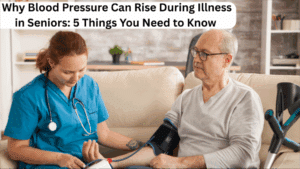
Older adults can often feel a little “off” when they are battling some seasonal bug or infection, but families may not realize that illness has the potential to slowly affect blood pressure.
Coughing, fever, and even dehydration may seem minor, but these stresses place added strain on the body, particularly when you are older. For people already dealing with illnesses, that stress can manifest itself as unexpected spikes in blood pressure.
This is where knowledge becomes key. Changes in blood pressure during illness can start slowly, but can worsen without family and caregivers knowing. Families and caregivers need to know what to observe, why it happens, and what actions to take.
Understanding the relation between illness and increasing blood pressure impacting seniors goes beyond health literacy. It’s about safety and peace of mind. Let’s explore key things you should know.
Why Illness Can Impact Blood Pressure in Seniors
When a disease strains the body, the immune system tends to work more, and this usually causes the heart rate and blood vessel activity to change. In older adults, this reaction may be more acute.
Fever, pain, dehydration, or even certain medications can induce unexpected elevations in blood pressure. Where younger adults can rebound quickly from these transitory elevations, older adults often have less reserve, making the potential for sudden spikes much riskier.
That’s why it’s essential for caregivers to remember that what appears to be a minor cold or infection may hold additional cardiovascular effects. Strategizing how to see changes in health and respond in a timely manner can make a huge difference.
This is where the best medical alert for elderly individuals proves valuable, ensuring immediate help can be accessed if illness leads to a dangerous blood pressure event.
Recognizing the Signs of Rising Blood Pressure
There are no clear warning signs of high blood pressure, yet the disease can cause small signs to be noticeable. Feeling dizzy, getting a headache or experiencing unusual fatigue can be ignored as being sick, but are signals of increasing blood pressure.
In seniors, such minor changes can rapidly turn into severe complications of confusion, chest pain, or even fainting. Caregivers and family members need to observe these signs and be ready to act. Medical professionals indicate that blood pressure should be noted during bouts of illness in order to stay out of the hospital.
Having regular monitoring accompanied by the best medical alert system for older adults provides a quick method of getting assistance should a cataclysmic change change occur. Together, these steps allow families to catch problems quickly and reduce the chance of serious problems.
The Role of Dehydration and Medications
The illness itself often includes side effects like fever, sweating, or appetite suppression, which can all cause dehydration. Mild dehydration can cause the blood to thicken, resulting in the heart having to work a little harder and blood pressure rising.
Some medications prescribed for acute infections or pain may also disrupt normal blood pressure regulation. Seniors who already manage chronic conditions may experience greater volume fluctuations, causing elevated blood pressure.
Although hydration and medicating can help reduce risks, it isn’t always enough. The unpredictability of illness can create uncertainty in predictive care.
That’s why many families opt for the best medical alert for elders, to have peace of mind that if something happens or symptoms worsen suddenly, help can be dispatched immediately. That works to provide peace of mind to both seniors and families when added to their care plan.
Why Monitoring Becomes Even More Important with Age
As we age, blood vessels naturally lose some elasticity, which can affect our body’s ability to respond to changes in pressure resulting from illness. For older adults, this increases their risk of sudden surges/drops in blood pressure, even from minor health factors.
Regular blood pressure readings are less about a particular number from a machine and rather about identifying changes rapidly before things escalate. Caregivers who help seniors track blood pressure during illness provide a valuable layer of protection.
At the same time, no one can be present every moment. That is where the best medical alert for older adults helps by making it easy to know help is there if blood pressure changes lead to a medical event requiring urgent care.
When incorporated with regular monitoring, the best medical alert systems ultimately help create a safer environment for seniors.
How Medical Alert Systems Support Senior Safety
In addition to monitoring, getting quick access to help during a health scare can be the difference between a manageable event and a medical crisis. Medical alert systems are designed to provide safety for those who may need help with the push of a button.
This safety becomes even more important in illness situations when dizziness, fainting, or confusion related to high blood pressure may occur suddenly. From fall detection to continuous emergency response and direct communication with responders, this technology offers real, tangible protection.
Families seeking the best medical alert for elderly loved ones can feel confident about their aging loved one’s safety. Illness can make anyone feel vulnerable, but this kind of technology provides additional peace of mind.
Combining proactive monitoring with responsive technologies allows families to create a circle of care that lessens anxiety and supports autonomy.
Conclusion
Illness may be temporary, but the changes it causes in a senior’s blood pressure can have lasting consequences if overlooked. What begins as mild fatigue or dehydration can escalate rapidly, leaving families unprepared and caught off guard.
That’s why understanding the connection between illness and blood pressure is so important, and why preparation matters just as much as awareness. Regular monitoring, attentive caregiving, and access to reliable support systems work together to protect seniors during vulnerable times.
Choosing the best medical alert for elderly individuals adds a critical layer of safety, ensuring that when sudden changes happen, help is never out of reach. It’s peace of mind families can count on.